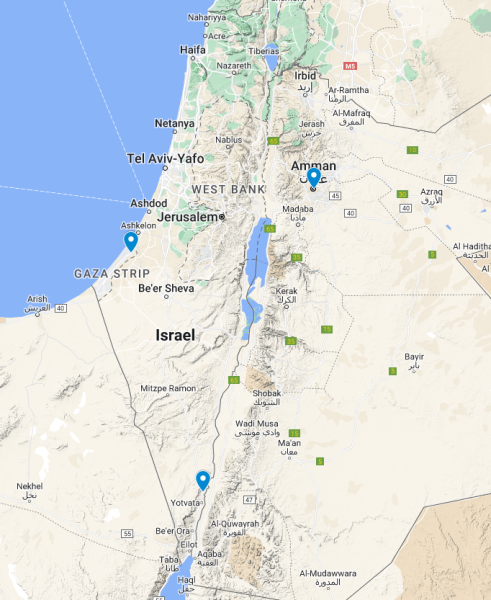Rockets Fired on U.S. military base in Iraq
Following a drone attack in the Baghdad International Airport in early January 2020 that resulted in the death of Qassim Suleimani, the commander of Iranian forces, tensions between the United States and Iraq have grown more and more violent.
In the early weeks of February, a civilian contractor was killed and a U.S. service member and five others were injured in an airstrike that struck Erbil and the region surrounding it.
Little-known Shiite armed group — transated as Guardian of the Blood — claimed responsibility for this deadly attack, as well as two additional bombings against U.S. contractor convoys back in August of last year.
On Feb. 15, 107 mm rockets were launched near Erbil Airport in northern Iraq, which resulted in the fatality of a Filipino contractor and casualties of six others, including a Louisiana National Guard soldier and four American contractors.
Iraqi officials have taken two of the men who were responsible for this attack into custody.
While Heidar al-Bayati’s name has been released as a suspect in custody, the name of the other has yet to be disclosed.
In late February, President Biden authorized the United States to carry out airstrikes in eastern Syria, following the airstrike on the Erbil International Airport in Kurdish and other regions of Erbil.
In order to avoid diplomatic blowback to the Iraqi government, these strikes took place just over the border in Syria in the town of Aub Kamal.
These overnight airstrikes hit three loaded trucks, resulting in 22 fatalities. Though Rami Abdulrahman, the head of the Syrian Observatory for Human Rights, suggested that this number was expected to rise as a result of the number of people who were critically injured.
“This proportionate military response was conducted together with diplomatic measures, including consultation with coalition partners,” Biden said.
Additional comments were made by John F. Kirby, the Pentagon press secretary.
“We have acted in a deliberate manner that aims to de-escalate the overall situation in both eastern Syria and Iraq,” stated Kirby
The Iran-backed militia Kataib Hezbollah revealed that one of its fighters, who was a member of the Popular Mobilization Forces — a part of the Iraqi security forces that are helping to prevent infiltration by the Islamic State — had been killed in the airstrike in Syria.
In retaliation to this airstrike, an Iraqi-backed militia fired ten rockets at a military base in Iraq that had been hosting approximately 2,000 U.S.-led coalition troops.
According to a tweet posted by Operation Inherent Resolve military spokesman Colonel Wayne Marotto, the rockets had been targeted at the Ain al-Asad air base on March 3.
Major General Tahseen al-Khafaji of the Iraqi security forces suggested that there was no damage reported at the base, and that the security forces are still investigating who is behind the attack.
While no one has claimed responsibility for this attack, Defense Secretary Lloyd Austin expressed concern that the same people who had launched the airstrike on the attack on the Erbil International Airport had also been the ones behind the attack on the U.S. military base.
Jessica McNulty, a Pentagon spokesperson, backed this statement.
“We assess that C-RAM effectively engaged four of the 10 rockets that impact the base,” McNulty said. “None of the rockets made direct hits on any structures or vehicles. There was some minor shrapnel damage that will not have any impact on operations at Al Asad.”
In spite of all of the positive feedback about the attack, members of different government agencies have expressed their displeasure.
One such person, Representative Rho Khana (D-CA),on the House Armed Services Committee, mentioned that there was no possible justification for these attacks during an interview with CNN.
“Offensive military action without congressional approval is not constitutional absent (from) extraordinary circumstances. Congress must be fully briefed on this matter expeditiously,” stated Khanna
The rocket attacks on the U.S. military base were carried out while Washington and Tehran are trying to find a way to return to the nuclear deal that had been abandoned by former U.S. President Donald Trump.
Not much is known about how these airstrikes will affect the efforts by the United States to coax Iran back into a negotiating position from both.
“Even though we’re highly committed to reestablishing dialogue with the Iranians, we can undertake military strikes at the same time,” said Michael Knights, an analyst at the Washington Institute for Near East Policy







Stan Squires • May 4, 2021 at 10:47 pm
I am from Vancouver,Canada and i wanted to say that the American Forces in Iraq is a problem that needs to be solved. Their not going to leave on their own.So firing rockets at their bases in Iraq is a good way to get them to leave Iraq.
When the Yankees were in Vietnam the Vietnamese People fought them right up to the end.That was the only to get them to leave.The same thing needs to be done in Iraq.Yankee Imperialism in Iraq,Syria needs to be overthrown by whatever means necessary.Yankees Go Home. is the slogan used against Yankee Imperialism in all parts of the world.